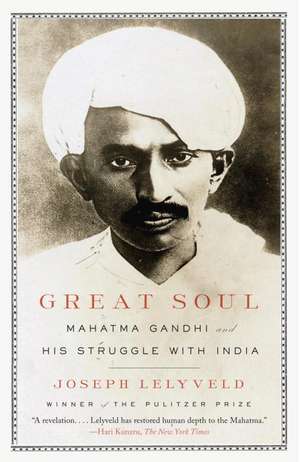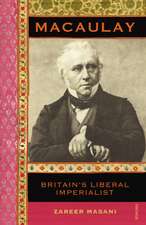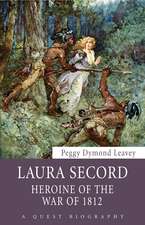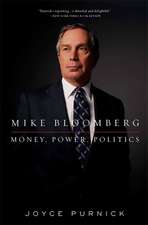Great Soul: Mahatma Gandhi and His Struggle with India
Autor Joseph Lelyvelden Limba Engleză Paperback – 31 mar 2012
Pulitzer Prize–winner Joseph Lelyveld shows in vivid, unmatched detail how Gandhi’s sense of mission, social values, and philosophy of nonviolent resistance were shaped on another subcontinent—during two decades in South Africa—and then tested by an India that quickly learned to revere him as a Mahatma, or “Great Soul,” while following him only a small part of the way to the social transformation he envisioned. The man himself emerges as one of history’s most remarkable self-creations, a prosperous lawyer who became an ascetic in a loincloth wholly dedicated to political and social action. Lelyveld leads us step-by-step through the heroic—and tragic—last months of this selfless leader’s long campaign when his nonviolent efforts culminated in the partition of India, the creation of Pakistan, and a bloodbath of ethnic cleansing that ended only with his own assassination.
India and its politicians were ready to place Gandhi on a pedestal as “Father of the Nation” but were less inclined to embrace his teachings. Muslim support, crucial in his rise to leadership, soon waned, and the oppressed untouchables—for whom Gandhi spoke to Hindus as a whole—produced their own leaders.
Here is a vital, brilliant reconsideration of Gandhi’s extraordinary struggles on two continents, of his fierce but, finally, unfulfilled hopes, and of his ever-evolving legacy, which more than six decades after his death still ensures his place as India’s social conscience—and not just India’s.
Preț: 119.74 lei
Nou
Puncte Express: 180
Preț estimativ în valută:
22.92€ • 23.84$ • 18.92£
22.92€ • 23.84$ • 18.92£
Carte disponibilă
Livrare economică 24 martie-07 aprilie
Preluare comenzi: 021 569.72.76
Specificații
ISBN-13: 9780307389954
ISBN-10: 0307389952
Pagini: 448
Ilustrații: 35 PHOTOGRAPHS; 3 MAPS
Dimensiuni: 130 x 203 x 25 mm
Greutate: 0.41 kg
Editura: Vintage Publishing
ISBN-10: 0307389952
Pagini: 448
Ilustrații: 35 PHOTOGRAPHS; 3 MAPS
Dimensiuni: 130 x 203 x 25 mm
Greutate: 0.41 kg
Editura: Vintage Publishing
Notă biografică
Joseph Lelyveld’s interest in Gandhi dates back to tours in India and South Africa as a correspondent for The New York Times, where he worked for nearly four decades, ending up as executive editor from 1994 to 2001. His book on apartheid, Move Your Shadow: South Africa, Black and White, won the Pulitzer Prize for General Nonfiction. He is also the author of Omaha Blues: A Memory Loop. He lives in New York.
Extras
1
PROLOGUE:
AN UNWELCOME VISITOR
It was a brief only a briefless lawyer might have accepted. Mohandas Gandhi landed in South Africa as an untested, unknown twenty-three- year-old law clerk brought over from Bombay, where his effort to launch a legal career had been stalled for more than a year. His stay in the country was expected to be temporary, a year at most. Instead, a full twenty-one years elapsed before he made his final departure on July 14, 1914. By then, he was forty-four, a seasoned politician and negotiator, recently leader of a mass movement, author of a doctrine for such struggles, a pithy and prolific political pamphleteer, and more-a self-taught evangelist on matters spiritual, nutritional, even medical. That's to say, he was well on his way to becoming the Gandhi India would come to revere and, sporadically, follow.
None of that was part of the original job description. His only mission at the outset was to assist in a bitter civil suit between two Muslim trading firms with roots of their own in Porbandar, the small port on the Arabian Sea, in the northwest corner of today's India, where he was born. All the young lawyer brought to the case were his fluency in English and Gujarati, his first language, and his recent legal training at the Inner Temple in London; his lowly task was to function as an interpreter, culturally as well as linguistically, between the merchant who engaged him and the merchant's English attorney.
Up to this point there was no evidence of his ever having had a spontaneous political thought. During three years in London-and the nearly two years of trying to find his feet in India that followed-his causes were dietary and religious: vegetarianism and the mystical cult known as Theosophy, which claimed to have absorbed the wisdom of the East, in particular of Hinduism, about which Gandhi, looking for footholds on a foreign shore, had more curiosity then than scriptural knowledge himself. Never a mystic, he found fellowship in London with other seekers on what amounted, metaphorically speaking, to a small weedy fringe, which he took to be common ground between two cultures.
South Africa, by contrast, challenged him from the start to explain what he thought he was doing there in his brown skin. Or, more precisely, in his brown skin, natty frock coat, striped pants, and black turban, flattened in the style of his native Kathiawad region, which he wore into a magistrate's court in Durban on May 23, 1893, the day after his arrival. The magistrate took the headgear as a sign of disrespect and ordered the unknown lawyer to remove it; instead, Gandhi stalked out of the courtroom. The small confrontation was written up the next day in The Natal Advertiser in a sardonic little article titled "An Unwelcome Visitor." Gandhi immediately shot off a letter to the newspaper, the first of dozens he'd write to deflect or deflate white sentiments. "Just as it is a mark of respect amongst Europeans to take off their hats," he wrote, an Indian shows respect by keeping his head covered. "In England, on attending drawing-room meetings and evening parties, Indians always keep the head-dress, and the English ladies and gentlemen seem to appreciate the regard which we show thereby."
The letter saw print on what was only the fourth day the young nonentity had been in the land. It's noteworthy because it comes nearly two weeks before a jarring experience of racial insult, on a train heading inland from the coast, that's generally held to have fired his spirit of resistance. The letter to the Advertiser would seem to demonstrate that Gandhi's spirit didn't need igniting; its undertone of teasing, of playful jousting, would turn out to be characteristic. Yet it's the train incident that's certified as transformative not only in Richard Attenborough's film Gandhi or Philip Glass's opera Satyagraha but in Gandhi's own Autobiography, written three decades after the event.
If it wasn't character forming, it must have been character arousing (or deepening) to be ejected, as Gandhi was at Pietermaritzburg, from a first-class compartment because a white passenger objected to having to share the space with a "coolie." What's regularly underplayed in the countless renditions of the train incident is the fact that the agitated young lawyer eventually got his way. The next morning he fired off telegrams to the general manager of the railway and his sponsor in Durban. He raised enough of a commotion that he finally was allowed to reboard the same train from the same station the next night under the protection of the stationmaster, occupying a first-class berth.
The rail line didn't run all the way to Johannesburg in those days, so he had to complete the final leg of the trip by stagecoach. Again he fell into a clash that was overtly racial. Gandhi, who'd refrained from making a fuss about being seated outside on the coach box next to the driver, was dragged down at a rest stop by a white crewman who wanted the seat for himself. When he resisted, the crewman called him a "sammy"-a derisive South African epithet for Indians (derived from "swami," it's said)-and started thumping him. In Gandhi's retelling, his protests had the surprising effect of rousing sympathetic white passengers to intervene on his behalf. He manages to keep his seat and, when the coach stops for the night, shoots off a letter to the local supervisor of the stagecoach company, who then makes sure that the young foreigner is seated inside for the final stage of the journey.
All the newcomer's almost instantaneous retorts in letters and telegrams tell us that young Mohan, as he would have been called, brought his instinct for resistance (what the psychoanalyst Erik Erikson called his "eternal negative") with him to South Africa. Its alien environment would prove a perfect place for that instinct to flourish. In what was still largely a frontier society, the will to white domination had yet to produce a settled racial order. (It never would, in fact, though the attempt would be systematically made.) Gandhi would not have to seek conflict; it would find him.
In these bumpy first days in a new land, Mohan Gandhi comes across on first encounters as a wiry, engaging figure, soft-spoken but not at all reticent. His English is on its way to becoming impeccable, and he's as well dressed in a British manner as most whites he meets. He can stand his ground, but he's not assertive or restless in the sense of seeming unsettled. Later he would portray himself as having been shy at this stage in his life, but in fact he consistently demonstrates a poise that may have been a matter of heritage: he's the son and grandson of diwans, occupants of the top civil position in the courts of the tiny princely states that proliferated in the part of Gujarat where he grew up. A diwan was a cross between a chief minister and an estate manager. Gandhi's father evidently failed to dip into his rajah's coffers for his own benefit and remained a man of modest means. But he had status, dignity, and assurance to bequeath. These attributes in combination with his brown skin and his credentials as a London-trained barrister are enough to mark the son as unusual in that time and place in South Africa: for some, at least, a sympathetic, arresting figure.
He's susceptible to moral appeals and ameliorative doctrines but not particularly curious about his new surroundings or the tangle of moral issues that are as much part of the new land as its hardy flora. He has left a wife and two sons behind in India and has yet to import the string of nephews and cousins who'd later follow him to South Africa, so he's very much on his own. Because he failed to establish himself as a lawyer in Bombay, his temporary commission represents his entire livelihood and that of his family, so he can reasonably be assumed to be on the lookout for ways to jump-start a career. He wants his life to matter, but he's not sure where or how; in that sense, like most twenty-three-year-olds, he's vulnerable and unfinished. He's looking for something-a career, a sanctified way of life, preferably both-on which to fasten. You can't easily tell from the autobiography he'd dash off in weekly installments more than three decades later, but at this stage he's more the unsung hero of an East-West bildungsroman than the Mahatma in waiting he portrays who experiences few doubts or deviations after his first weeks in London before he turned twenty. The Gandhi who landed in South Africa doesn't seem a likely recipient of the spiritual honorific-"Mahatma" means "Great Soul"-that the poet Rabindranath Tagore affixed to his name years later, four years after his return to India. His transformation or self-invention-a process that's as much inward as outward-takes years, but once it's under way, he's never again static or predictable.
Toward the end of his life, when he could no longer command the movement he'd led in India, Gandhi found words in a Tagore song to express his abiding sense of his own singularity: "I believe in walking alone. I came alone in this world, I have walked alone in the valley of the shadow of death, and I shall quit alone, when the time comes." He wouldn't have put it quite so starkly when he landed in South Africa, but he felt himself to be walking alone in a way he could hardly have imagined had he remained in the cocoon of his Indian extended family.
He'd have other racial encounters of varying degrees of nastiness as he settled into a rough-and-ready South Africa where whites wrote the rules: in Johannesburg, the manager of the Grand National Hotel would look him over and only then discover there were no free rooms; in Pretoria, where there was actually a bylaw reserving sidewalks for the exclusive use of whites, a policeman on guard in front of President Paul Kruger's house would threaten to cuff the strolling newcomer into the road for transgressing on the pavement; a white barber there would refuse to cut his hair; in Durban the law society would object to his being registered as an advocate, a status hitherto reserved for whites; he would be denied admission to a worship service at an Anglican church.
It would take a full century for such practices to grind to a halt, for white minority rule finally to reach its inevitable and well- deserved end in South Africa. Now new monuments to Gandhi are scattered about the land, reflecting the heroic role attributed to him in the country's rewritten history. I saw such monuments not only at the Phoenix Settlement but in Durban, Pietermaritzburg, Ladysmith, and Dundee. Nearly always it was the elderly figure Winston Churchill scorned as "a seditious Middle Temple lawyer now posing as a fakir . . . striding half-naked" who was portrayed, not the tailored South African lawyer. (Probably that was because most of these statues and busts had been shipped from India, supplied by its government.) In Johannesburg, however, in a large urban space renamed Gandhi Square- formerly it bore the name of an Afrikaner bureaucrat-the South African Gandhi is shown in mufti, striding in the direction of the site of the now-demolished law court where he appeared both as attorney and as prisoner, his bronze lawyer's robe fluttering over a bronze Western suit. Gandhi Square is just around the corner from his old law office at the corner of Rissik and Anderson streets, where he received visitors under a tinctured image of Jesus Christ. The vegetarian restaurant, steps away, where he first encountered his closest white friends is long gone; hard by the place where it stood, perhaps exactly on the spot, a McDonald's now does a fairly brisk nonvegetarian trade. But it's not entirely far-fetched for the new South Africa to claim Gandhi as its own, even if he failed to foresee it for most of his time in the country. In finding his feet there, he formed the persona he would inhabit in India in the final thirty-three years of his life, when he set an example that colonized peoples across the globe, including South Africans, would find inspiring.
One of the new Gandhi memorials sits on a platform of the handsome old railway station in Pietermaritzburg-Maritzburg for short-close to the spot where the newcomer detrained, under a corrugated iron roof trimmed with what appears to be the original Victorian filigree. The plaque says his ejection from the train "changed the course" of Gandhi's life. "He took up the fight against racial oppression," it proclaims. "His active non-violence started from that day."
That's an inspirational paraphrase of Gandhi's Autobiography, but it's squishy as history. Gandhi claims in the Autobiography to have called a meeting on arrival in Pretoria to rally local Indians and inspire them to face up to the racial situation. If he did, little came of it. In that first year, he had yet to assume a mantle of leadership; he was not even seen as a resident, just a junior lawyer imported from Bombay on temporary assignment. His undemanding legal work left him with time on his hands, which he devoted more to religion than to politics; in this new environment, he became an even more serious and eclectic spiritual seeker than he'd been in London. This was a matter of chance as well as inclination. The attorney he was supposed to assist turned out to be an evangelical Christian with a more intense interest in Gandhi's soul than in the commercial case on which they were supposed to be working. Gandhi spent much of his time in a prolonged engagement with white evangelicals who found in him a likely convert. He even attended daily prayer meetings, which regularly included prayers that the light would shine for him.
He told his new friends, all whites, that he was spiritually uncommitted but nearly always denied thereafter that he'd ever seriously contemplated conversion. However, according to the scholar who has made the closest study of Gandhi's involvement with missionaries, it took him two years to resolve the question in his own mind. On one occasion Gandhi acknowledged as much to Millie Polak, the wife of a British lawyer who was part of his inner circle for his last ten years in South Africa. "I did once seriously think of embracing Christianity," she quoted him as having said. "I was tremendously attracted to Christianity, but eventually I came to the conclusion that there was nothing really in your scriptures that we had not got in ours, and that to be a good Hindu also meant I would be a good Christian."
Late in 1894 we find this free-floating, ecumenical novice flirting, or so it sometimes seemed, with several religious sects at once, writing to The Natal Mercury on behalf of a movement called the Esoteric Christian Union, a synthesizing school of belief, as he explained it, that sought to reconcile all religions by showing that each represents the same eternal truths. (It's a theme Gandhi would repeat at prayer meetings in the last years and months of his life, more than a half century later, where the spirit was so all-embracing that "O God, Our Help in Ages Past" had its place among chanted Hindu and Muslim prayers.) In an advertisement for a selection of tracts meant to accompany a letter to the editor he wrote in 1894, he identified himself proudly as an "Agent for the Esoteric Christian Union and the London Vegetarian Society."
From the Hardcover edition.
PROLOGUE:
AN UNWELCOME VISITOR
It was a brief only a briefless lawyer might have accepted. Mohandas Gandhi landed in South Africa as an untested, unknown twenty-three- year-old law clerk brought over from Bombay, where his effort to launch a legal career had been stalled for more than a year. His stay in the country was expected to be temporary, a year at most. Instead, a full twenty-one years elapsed before he made his final departure on July 14, 1914. By then, he was forty-four, a seasoned politician and negotiator, recently leader of a mass movement, author of a doctrine for such struggles, a pithy and prolific political pamphleteer, and more-a self-taught evangelist on matters spiritual, nutritional, even medical. That's to say, he was well on his way to becoming the Gandhi India would come to revere and, sporadically, follow.
None of that was part of the original job description. His only mission at the outset was to assist in a bitter civil suit between two Muslim trading firms with roots of their own in Porbandar, the small port on the Arabian Sea, in the northwest corner of today's India, where he was born. All the young lawyer brought to the case were his fluency in English and Gujarati, his first language, and his recent legal training at the Inner Temple in London; his lowly task was to function as an interpreter, culturally as well as linguistically, between the merchant who engaged him and the merchant's English attorney.
Up to this point there was no evidence of his ever having had a spontaneous political thought. During three years in London-and the nearly two years of trying to find his feet in India that followed-his causes were dietary and religious: vegetarianism and the mystical cult known as Theosophy, which claimed to have absorbed the wisdom of the East, in particular of Hinduism, about which Gandhi, looking for footholds on a foreign shore, had more curiosity then than scriptural knowledge himself. Never a mystic, he found fellowship in London with other seekers on what amounted, metaphorically speaking, to a small weedy fringe, which he took to be common ground between two cultures.
South Africa, by contrast, challenged him from the start to explain what he thought he was doing there in his brown skin. Or, more precisely, in his brown skin, natty frock coat, striped pants, and black turban, flattened in the style of his native Kathiawad region, which he wore into a magistrate's court in Durban on May 23, 1893, the day after his arrival. The magistrate took the headgear as a sign of disrespect and ordered the unknown lawyer to remove it; instead, Gandhi stalked out of the courtroom. The small confrontation was written up the next day in The Natal Advertiser in a sardonic little article titled "An Unwelcome Visitor." Gandhi immediately shot off a letter to the newspaper, the first of dozens he'd write to deflect or deflate white sentiments. "Just as it is a mark of respect amongst Europeans to take off their hats," he wrote, an Indian shows respect by keeping his head covered. "In England, on attending drawing-room meetings and evening parties, Indians always keep the head-dress, and the English ladies and gentlemen seem to appreciate the regard which we show thereby."
The letter saw print on what was only the fourth day the young nonentity had been in the land. It's noteworthy because it comes nearly two weeks before a jarring experience of racial insult, on a train heading inland from the coast, that's generally held to have fired his spirit of resistance. The letter to the Advertiser would seem to demonstrate that Gandhi's spirit didn't need igniting; its undertone of teasing, of playful jousting, would turn out to be characteristic. Yet it's the train incident that's certified as transformative not only in Richard Attenborough's film Gandhi or Philip Glass's opera Satyagraha but in Gandhi's own Autobiography, written three decades after the event.
If it wasn't character forming, it must have been character arousing (or deepening) to be ejected, as Gandhi was at Pietermaritzburg, from a first-class compartment because a white passenger objected to having to share the space with a "coolie." What's regularly underplayed in the countless renditions of the train incident is the fact that the agitated young lawyer eventually got his way. The next morning he fired off telegrams to the general manager of the railway and his sponsor in Durban. He raised enough of a commotion that he finally was allowed to reboard the same train from the same station the next night under the protection of the stationmaster, occupying a first-class berth.
The rail line didn't run all the way to Johannesburg in those days, so he had to complete the final leg of the trip by stagecoach. Again he fell into a clash that was overtly racial. Gandhi, who'd refrained from making a fuss about being seated outside on the coach box next to the driver, was dragged down at a rest stop by a white crewman who wanted the seat for himself. When he resisted, the crewman called him a "sammy"-a derisive South African epithet for Indians (derived from "swami," it's said)-and started thumping him. In Gandhi's retelling, his protests had the surprising effect of rousing sympathetic white passengers to intervene on his behalf. He manages to keep his seat and, when the coach stops for the night, shoots off a letter to the local supervisor of the stagecoach company, who then makes sure that the young foreigner is seated inside for the final stage of the journey.
All the newcomer's almost instantaneous retorts in letters and telegrams tell us that young Mohan, as he would have been called, brought his instinct for resistance (what the psychoanalyst Erik Erikson called his "eternal negative") with him to South Africa. Its alien environment would prove a perfect place for that instinct to flourish. In what was still largely a frontier society, the will to white domination had yet to produce a settled racial order. (It never would, in fact, though the attempt would be systematically made.) Gandhi would not have to seek conflict; it would find him.
In these bumpy first days in a new land, Mohan Gandhi comes across on first encounters as a wiry, engaging figure, soft-spoken but not at all reticent. His English is on its way to becoming impeccable, and he's as well dressed in a British manner as most whites he meets. He can stand his ground, but he's not assertive or restless in the sense of seeming unsettled. Later he would portray himself as having been shy at this stage in his life, but in fact he consistently demonstrates a poise that may have been a matter of heritage: he's the son and grandson of diwans, occupants of the top civil position in the courts of the tiny princely states that proliferated in the part of Gujarat where he grew up. A diwan was a cross between a chief minister and an estate manager. Gandhi's father evidently failed to dip into his rajah's coffers for his own benefit and remained a man of modest means. But he had status, dignity, and assurance to bequeath. These attributes in combination with his brown skin and his credentials as a London-trained barrister are enough to mark the son as unusual in that time and place in South Africa: for some, at least, a sympathetic, arresting figure.
He's susceptible to moral appeals and ameliorative doctrines but not particularly curious about his new surroundings or the tangle of moral issues that are as much part of the new land as its hardy flora. He has left a wife and two sons behind in India and has yet to import the string of nephews and cousins who'd later follow him to South Africa, so he's very much on his own. Because he failed to establish himself as a lawyer in Bombay, his temporary commission represents his entire livelihood and that of his family, so he can reasonably be assumed to be on the lookout for ways to jump-start a career. He wants his life to matter, but he's not sure where or how; in that sense, like most twenty-three-year-olds, he's vulnerable and unfinished. He's looking for something-a career, a sanctified way of life, preferably both-on which to fasten. You can't easily tell from the autobiography he'd dash off in weekly installments more than three decades later, but at this stage he's more the unsung hero of an East-West bildungsroman than the Mahatma in waiting he portrays who experiences few doubts or deviations after his first weeks in London before he turned twenty. The Gandhi who landed in South Africa doesn't seem a likely recipient of the spiritual honorific-"Mahatma" means "Great Soul"-that the poet Rabindranath Tagore affixed to his name years later, four years after his return to India. His transformation or self-invention-a process that's as much inward as outward-takes years, but once it's under way, he's never again static or predictable.
Toward the end of his life, when he could no longer command the movement he'd led in India, Gandhi found words in a Tagore song to express his abiding sense of his own singularity: "I believe in walking alone. I came alone in this world, I have walked alone in the valley of the shadow of death, and I shall quit alone, when the time comes." He wouldn't have put it quite so starkly when he landed in South Africa, but he felt himself to be walking alone in a way he could hardly have imagined had he remained in the cocoon of his Indian extended family.
He'd have other racial encounters of varying degrees of nastiness as he settled into a rough-and-ready South Africa where whites wrote the rules: in Johannesburg, the manager of the Grand National Hotel would look him over and only then discover there were no free rooms; in Pretoria, where there was actually a bylaw reserving sidewalks for the exclusive use of whites, a policeman on guard in front of President Paul Kruger's house would threaten to cuff the strolling newcomer into the road for transgressing on the pavement; a white barber there would refuse to cut his hair; in Durban the law society would object to his being registered as an advocate, a status hitherto reserved for whites; he would be denied admission to a worship service at an Anglican church.
It would take a full century for such practices to grind to a halt, for white minority rule finally to reach its inevitable and well- deserved end in South Africa. Now new monuments to Gandhi are scattered about the land, reflecting the heroic role attributed to him in the country's rewritten history. I saw such monuments not only at the Phoenix Settlement but in Durban, Pietermaritzburg, Ladysmith, and Dundee. Nearly always it was the elderly figure Winston Churchill scorned as "a seditious Middle Temple lawyer now posing as a fakir . . . striding half-naked" who was portrayed, not the tailored South African lawyer. (Probably that was because most of these statues and busts had been shipped from India, supplied by its government.) In Johannesburg, however, in a large urban space renamed Gandhi Square- formerly it bore the name of an Afrikaner bureaucrat-the South African Gandhi is shown in mufti, striding in the direction of the site of the now-demolished law court where he appeared both as attorney and as prisoner, his bronze lawyer's robe fluttering over a bronze Western suit. Gandhi Square is just around the corner from his old law office at the corner of Rissik and Anderson streets, where he received visitors under a tinctured image of Jesus Christ. The vegetarian restaurant, steps away, where he first encountered his closest white friends is long gone; hard by the place where it stood, perhaps exactly on the spot, a McDonald's now does a fairly brisk nonvegetarian trade. But it's not entirely far-fetched for the new South Africa to claim Gandhi as its own, even if he failed to foresee it for most of his time in the country. In finding his feet there, he formed the persona he would inhabit in India in the final thirty-three years of his life, when he set an example that colonized peoples across the globe, including South Africans, would find inspiring.
One of the new Gandhi memorials sits on a platform of the handsome old railway station in Pietermaritzburg-Maritzburg for short-close to the spot where the newcomer detrained, under a corrugated iron roof trimmed with what appears to be the original Victorian filigree. The plaque says his ejection from the train "changed the course" of Gandhi's life. "He took up the fight against racial oppression," it proclaims. "His active non-violence started from that day."
That's an inspirational paraphrase of Gandhi's Autobiography, but it's squishy as history. Gandhi claims in the Autobiography to have called a meeting on arrival in Pretoria to rally local Indians and inspire them to face up to the racial situation. If he did, little came of it. In that first year, he had yet to assume a mantle of leadership; he was not even seen as a resident, just a junior lawyer imported from Bombay on temporary assignment. His undemanding legal work left him with time on his hands, which he devoted more to religion than to politics; in this new environment, he became an even more serious and eclectic spiritual seeker than he'd been in London. This was a matter of chance as well as inclination. The attorney he was supposed to assist turned out to be an evangelical Christian with a more intense interest in Gandhi's soul than in the commercial case on which they were supposed to be working. Gandhi spent much of his time in a prolonged engagement with white evangelicals who found in him a likely convert. He even attended daily prayer meetings, which regularly included prayers that the light would shine for him.
He told his new friends, all whites, that he was spiritually uncommitted but nearly always denied thereafter that he'd ever seriously contemplated conversion. However, according to the scholar who has made the closest study of Gandhi's involvement with missionaries, it took him two years to resolve the question in his own mind. On one occasion Gandhi acknowledged as much to Millie Polak, the wife of a British lawyer who was part of his inner circle for his last ten years in South Africa. "I did once seriously think of embracing Christianity," she quoted him as having said. "I was tremendously attracted to Christianity, but eventually I came to the conclusion that there was nothing really in your scriptures that we had not got in ours, and that to be a good Hindu also meant I would be a good Christian."
Late in 1894 we find this free-floating, ecumenical novice flirting, or so it sometimes seemed, with several religious sects at once, writing to The Natal Mercury on behalf of a movement called the Esoteric Christian Union, a synthesizing school of belief, as he explained it, that sought to reconcile all religions by showing that each represents the same eternal truths. (It's a theme Gandhi would repeat at prayer meetings in the last years and months of his life, more than a half century later, where the spirit was so all-embracing that "O God, Our Help in Ages Past" had its place among chanted Hindu and Muslim prayers.) In an advertisement for a selection of tracts meant to accompany a letter to the editor he wrote in 1894, he identified himself proudly as an "Agent for the Esoteric Christian Union and the London Vegetarian Society."
From the Hardcover edition.
Recenzii
“A revelation. . . . Lelyveld has restored human depth to the Mahatma.”
—Hari Kunzru, The New York Times
“Lelyveld shows us Gandhi in tight close-up, and he places the man in various frames of reference—social, political and religious—that allow us to understand and appreciate him not as a plaster saint but as a flesh-and-blood human who wrote himself into history, and not only because of his shimmering vision of a more perfect world but also because of his sheer force of will.”
—Jonathan Kirsch, Los Angeles Times
“Lelyveld brings . . . an intimate knowledge based on his years as a foreign correspondent for The New York Times in both South Africa and India and the exhaustive research he conducted with a rare and finely balanced sympathy. . . . The picture that emerges is of someone intensely human, with all the defects and weaknesses that suggests, but also a visionary with a profound social conscience and courage who gave the world a model for nonviolent revolution that is still inspiring.”
—Anita Desai, The New York Review of Books
“Rather than focus on Gandhi’s chronology, Lelyveld slices through his life to understand his compulsions, read into his thought processes, and assess his actions and outcomes, maintaining a tone of admiring observation without tipping into hagiography or criticizing him with the wisdom that only hindsight can provide. . . . Lelyveld is a worthy interpreter of Gandhi’s varied life.”
—Salil Tripathi, The Washington Post
“A noteworthy book, vivid, nuanced and clear-eyed. . . . Lelyveld brings to his subject a reporter’s healthy skepticism and an old India hand’s stubborn fascination with the subcontinent and its people.”
—Geoffrey C. Ward, The New York Times Book Review
“A deeply insightful analysis of perhaps the most intriguing political leader of our time. A marvelous book.”
—Amartya Sen, Nobel Prize winner in economics and author of The Idea of Justice
“Lelyveld shatters the attractive myth . . . of the brave little man in a loincloth bringing down a mighty empire.”
—Pankaj Mishra, The New Yorker
“Lelyveld is a determined researcher. . . . He succeeds in leaving us with a fuller picture of Gandhi as a leader and a man.”
—Bill Williams, The Boston Globe
“Closely researched. . . . A sometimes wry but always clear-eyed weighing of Gandhi’s achievements against his goals. . . . Sobering but moving.”
—Madhusree Mukerjee, The Philadelphia Inquirer
“Great Soul is that rare achievement: a book that says something new about one of the most familiar figures of modern times. . . . Elegantly written, clear-eyed, and bracingly original, this is a magnificent biography of Gandhi’s conscience.”
—T.J. Stiles, Pulitzer Prize-winning author of The First Tycoon
“A revealing, original portrait. . . . Taking up a story already portrayed in countless books and films, Lelyveld constructs a fresh narrative. . . . He succeeds in painting Gandhi the spiritual leader as remarkably human.”
—Christine Armario, Associated Press
“Lelyveld scrupulously refrains from apportioning either blame or praise. . . . He lays out the facts and leaves readers to summon up their own interpretations and reactions to them. . . . We might view the writing of this book as an act of salvation, for what person's legacy can ever fully bear the burden of the high honorific of a Great Soul without coming up short?”
—Mirdu Rai, San Francisco Chronicle
“Gandhi’s story is one of the most inspiring in history, and Joseph Lelyveld proves himself equally inspiring in telling the story. This book is a brilliant and glittering match, brimming with—well, soul.”
—Nicholas D. Kristof, coauthor of Half the Sky
“Meticulously researched. . . . Refreshingly candid. . . . Although Lelyveld focuses on the high points of Gandhi’s life, he attempts to show his human side by illuminating the trials, ambiguities and eccentricities of the man. . . . [A] fine work.”
—Bharti Kirchner, The Seattle Times
“Lelyveld wrestles breathtakingly with the Gandhi-inspired conundrums on a high intellectual plane, with clear writing as a bonus.”
—Steve Weinberg, The Christian Science Monitor
“Written with graceful elegance, Lelyveld’s intricate portrait of Gandhi’s conflicted character invites us past the common illusions about one of the twentieth century’s most momentous figures.”
—David K. Shipler, author of The Working Poor
“Fascinating. . . . [A] sophisticated analysis. . . . Gandhi, even riddled with his foibles and failures, inspires awe. But, as Lelyveld observes, he demanded not reverence, but action.”
—Alan Cate, Cleveland Plain Dealer
“By the time we put down this deeply resonant, even sonorous book, we can only begin to appreciate how difficult it must have been for Gandhi to live out his character, his persona and his destiny. . . . The most effective Gandhi biography thus far.”
—Ananya Vajpeyi, The Caravan (India)
—Hari Kunzru, The New York Times
“Lelyveld shows us Gandhi in tight close-up, and he places the man in various frames of reference—social, political and religious—that allow us to understand and appreciate him not as a plaster saint but as a flesh-and-blood human who wrote himself into history, and not only because of his shimmering vision of a more perfect world but also because of his sheer force of will.”
—Jonathan Kirsch, Los Angeles Times
“Lelyveld brings . . . an intimate knowledge based on his years as a foreign correspondent for The New York Times in both South Africa and India and the exhaustive research he conducted with a rare and finely balanced sympathy. . . . The picture that emerges is of someone intensely human, with all the defects and weaknesses that suggests, but also a visionary with a profound social conscience and courage who gave the world a model for nonviolent revolution that is still inspiring.”
—Anita Desai, The New York Review of Books
“Rather than focus on Gandhi’s chronology, Lelyveld slices through his life to understand his compulsions, read into his thought processes, and assess his actions and outcomes, maintaining a tone of admiring observation without tipping into hagiography or criticizing him with the wisdom that only hindsight can provide. . . . Lelyveld is a worthy interpreter of Gandhi’s varied life.”
—Salil Tripathi, The Washington Post
“A noteworthy book, vivid, nuanced and clear-eyed. . . . Lelyveld brings to his subject a reporter’s healthy skepticism and an old India hand’s stubborn fascination with the subcontinent and its people.”
—Geoffrey C. Ward, The New York Times Book Review
“A deeply insightful analysis of perhaps the most intriguing political leader of our time. A marvelous book.”
—Amartya Sen, Nobel Prize winner in economics and author of The Idea of Justice
“Lelyveld shatters the attractive myth . . . of the brave little man in a loincloth bringing down a mighty empire.”
—Pankaj Mishra, The New Yorker
“Lelyveld is a determined researcher. . . . He succeeds in leaving us with a fuller picture of Gandhi as a leader and a man.”
—Bill Williams, The Boston Globe
“Closely researched. . . . A sometimes wry but always clear-eyed weighing of Gandhi’s achievements against his goals. . . . Sobering but moving.”
—Madhusree Mukerjee, The Philadelphia Inquirer
“Great Soul is that rare achievement: a book that says something new about one of the most familiar figures of modern times. . . . Elegantly written, clear-eyed, and bracingly original, this is a magnificent biography of Gandhi’s conscience.”
—T.J. Stiles, Pulitzer Prize-winning author of The First Tycoon
“A revealing, original portrait. . . . Taking up a story already portrayed in countless books and films, Lelyveld constructs a fresh narrative. . . . He succeeds in painting Gandhi the spiritual leader as remarkably human.”
—Christine Armario, Associated Press
“Lelyveld scrupulously refrains from apportioning either blame or praise. . . . He lays out the facts and leaves readers to summon up their own interpretations and reactions to them. . . . We might view the writing of this book as an act of salvation, for what person's legacy can ever fully bear the burden of the high honorific of a Great Soul without coming up short?”
—Mirdu Rai, San Francisco Chronicle
“Gandhi’s story is one of the most inspiring in history, and Joseph Lelyveld proves himself equally inspiring in telling the story. This book is a brilliant and glittering match, brimming with—well, soul.”
—Nicholas D. Kristof, coauthor of Half the Sky
“Meticulously researched. . . . Refreshingly candid. . . . Although Lelyveld focuses on the high points of Gandhi’s life, he attempts to show his human side by illuminating the trials, ambiguities and eccentricities of the man. . . . [A] fine work.”
—Bharti Kirchner, The Seattle Times
“Lelyveld wrestles breathtakingly with the Gandhi-inspired conundrums on a high intellectual plane, with clear writing as a bonus.”
—Steve Weinberg, The Christian Science Monitor
“Written with graceful elegance, Lelyveld’s intricate portrait of Gandhi’s conflicted character invites us past the common illusions about one of the twentieth century’s most momentous figures.”
—David K. Shipler, author of The Working Poor
“Fascinating. . . . [A] sophisticated analysis. . . . Gandhi, even riddled with his foibles and failures, inspires awe. But, as Lelyveld observes, he demanded not reverence, but action.”
—Alan Cate, Cleveland Plain Dealer
“By the time we put down this deeply resonant, even sonorous book, we can only begin to appreciate how difficult it must have been for Gandhi to live out his character, his persona and his destiny. . . . The most effective Gandhi biography thus far.”
—Ananya Vajpeyi, The Caravan (India)
Descriere
A vital, brilliant reconsideration of Gandhi's extraordinary struggles on two continents, of his fierce but unfulfilled hopes, and of his ever-evolving legacy, which ensures his place as one the world's most thoughtful social consciences.











